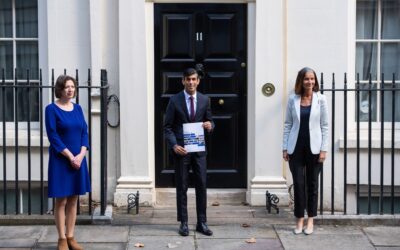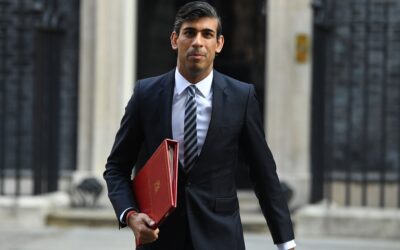Pubs, bars and nightclubs are among businesses warning that the new measures announced by Rishi Sunak to support jobs will not be enough to prevent further closures and a surge in unemployment.Meanwhile, the government’s plans for self-employed workers were described as “woefully inadequate” and leaving contractors facing a “dark winter ahead”.While some businesses welcomed the additional support, it is far less generous than the scheme it replaces, and many firms fear they will not survive the winter.The centrepiece of Thursday’s announcement was a short-time working scheme that will allow companies to cut down employees’ hours, with the government contributing towards wages for the hours not worked.Read moreHowever, staff costs per hour go up under the scheme because employers will still contribute to hours not worked. For example, a person who works one third of their hours (the minimum required to be eligible) would have 55 per cent of their wages paid by their employer, with the government paying 22 per cent. Employers will also be able to claim a previously announced £1,000 job retention bonus for staff they keep on until the end of January.Pubs and bars
The Independent Articles
Zhong Shanshan: China's new richest person is bottled water tycoon and vaccine investor
A bottled water tycoon and vaccine investor has become China’s richest man, after his wealth surpassed that of Alibaba founder Jack Ma.Zhong Shanshan, who started the water company Nongfu Spring in 1996, is now worth $58.7bn (£46.2bn) and is currently the 17th richest person in the world, according to the Bloomberg Billionaires Index. This puts him slightly ahead of tech entrepreneur Mr Ma, who has an estimated fortune of $56.7bn (£44.6bn).Mr Zhong, from Hangzhou in Zhejiang province, worked as a construction worker and newspaper reporter before going into business. The Chinese entrepreneur’s wealth has increased dramatically in recent months, after a pharmaceutical company he has a controlling stake in – Beijing Wantai Biological Pharmacy Enterprise – was listed in Shanghai in April.Read moreThe company is currently working on a Covid-19 vaccine.China’s now-richest person also had a second listing this year, when Nongfu Spring, China’s most popular bottled water brand, went public on the Hong Kong stock exchange in September, with its shares leaping by 54 per cent on its first day of trading.However, Mr Zhong may not be able to retain the top spot for long, as the Ant Group, which is backed by Mr Ma’s Alibaba, is anticipated to have its initial public offering (IPO) from as early as next month. It is thought that the tech company’s IPO will be one of the largest ever listings.
Cineworld raises doubts about its future after £1.3bn loss during lockdown
Cineworld has raised doubts over its ability to survive a second coronavirus lockdown after revealing a $1.6bn (£1.3bn) loss in the first half of the year.The cinema chain swung to a loss from a profit of $140m a year ago as revenues plummeted after lockdowns forced screens to close.
But Cineworld said current trading has been “encouraging considering the circumstances”, with solid demand for action-thriller and spy film Tenet released earlier this month.It said it was still in talks with lenders over breathing space for upcoming banking agreements, while it alerted over the potential need to boost finances again if it had to close its cinemas once more or if film releases were pushed back.
Cineworld warned: “There can be no certainty as to the future impact of Covid-19 on the group.
“If governments were to strengthen restrictions on social gathering, which may therefore oblige us to close our estate again or further push back movie releases, it would have a negative impact on our financial performance and likely require the need to raise additional liquidity.”
Watch moreThe group said 561 of its 778 sites worldwide have reopened, with 200 cinemas in the US, six in the UK and 11 in Israel still closed.
Cineworld said if the cinemas still closed in the US do not open before the end of October or there are further delays in the forecast significant movie releases to 2021, then extra financing would be needed.
In a “severe but plausible scenario” where a second wave of the pandemic caused further lengthy cinemas closures, then it would breach banking agreements in December and June 2021 and need further financing to continue to operate from early next year, it said.
Cineworld has already raised an extra $361m to help it weather the crisis so far.
Chief executive Mooky Greidinger said: “Despite the difficult events of the last few months, we have been delighted by the return of global audiences to our cinemas toward the end of the first half, as well as by the positive customer feedback we have received from those that have waited patiently to see a movie on the big screen again.”
He added: “Current trading has been encouraging considering the circumstances, further underpinning our belief that there remains a significant difference between watching a movie in a cinema – with high-quality screens and best-in-class sounds – to watching it at home.”
In May, Cineworld pulled out of a 28bn Canadian dollar (£1.6bn) deal to buy Canada’s biggest chain Cineplex, which would have created the biggest chain of cinemas in North America.
Will Rishi Sunak’s new job support scheme be enough to avert mass unemployment?
Whatever you do, don’t call it an extension. Having insisted for months that the furlough scheme would end in November come what may, Rishi Sunak was never going to stand up in the House of Commons to announce a simple rollover of the emergency jobs support system established earlier this year.That’s not the way politics works.
But is the distinction between the chancellor’s new “Jobs Support Scheme” announced on Thursday and the “Job Retention Scheme” really that large?Watch moreIn some ways the answer is no. Changes to the furlough scheme since August had already required employers to make a rising contribution to the wages of furloughed workers. They could also bring back workers part time, while continuing to claim the subsidy for the hours not worked.Any objective observer asked to place this new scheme on a policy continuum between what the chancellor unveiled in July – a £1,000 bonus for each worker brought back – and furlough would put it much closer to furlough.To that extent, the shadow chancellor, Anneliese Dodds, is justified in saying that the chancellor has performed a U-turn.Yet there are material differences between this and furlough.The level of support from the state to the payrolls of eligible companies is significantly lower. Under the new programme, the government’s maximum contribution to a worker’s wages falls to 22 per cent, down from 60 per cent under furlough. And only employees who are working at least a third of their normal hours will be eligible.The important question is, of course, whether it succeeds in stemming a steep rise in unemployment over the winter.Even before the latest restrictions, official forecasts were projecting a possibility of joblessness shooting up to 4 million by early next year as the furlough scheme ended. Will the new system help avert such a disaster for the jobs market? The answer is that it’s impossible to know for sure.The new wage subsidy might persuade managers, facing downsizing decisions, to wait until the economic outlook is clearer. The extension and rolling-over of the business loan support also announced by the chancellor will probably help on that front.But other employers might look at the size of the financial support on offer from November – and the considerably darkened economic outlook – and decide that holding on to workers whom they can’t employ full-time would simply be to delay the inevitable.The sad fact is that many employers will already have made their decisions, having started their redundancy consultation processes in recent weeks.It’s pretty hard to see how this scheme would make a material difference to employers’ decisions in the event of another national lockdown, which ministers have warned might be needed if the spread of the virus is not arrested by the new measures implemented this week. If the Treasury has a plan to protect jobs in those circumstances, it’s keeping it very well hidden.But that might be overly pessimistic. There’s some evidence that new coronavirus infection cases in Spain and France, which have been a few weeks ahead of the UK on the curve of this second wave of the epidemic, are slowing. Good news on a vaccine might arrive and brighten the economic outlook. And the fact that the new short-time working scheme has the broad support of the trade unions and the business lobby groups – and seems to have been designed with their input, as was the original furlough scheme – is a hopeful sign. Such groups are almost certainly closer to the thinking of private-sector decision-makers than ministers and Whitehall civil servants.Yet the bottom line is that the outlook on employment is as clouded and uncertain as that future of the pandemic.The proof of this wage-subsidy pudding will be in the eating this winter.
The big hole in Rishi Sunak’s Job Support Scheme
I don’t want to sound churlish about the wide ranging package of economic support announced by the chancellor, the centrepiece of which is the Job Support Scheme that will subsidise the wages of workers on short time as a result of the pandemic.There is much to like and it is to Rishi Sunak’s credit that he consulted with, and listened to, both unions and employers in formulating his plans.But there is still a gaping hole at the centre of them, which Shadow Chancellor Annalise Dodds, given the tough task of responding, hit the back of the net with: the lack of any mention of training.
Coronavirus: How can Rishi Sunak protect jobs when furlough scheme ends?
With new restrictions announced this week designed to slow a worrying rise in coronavirus cases, pressure is mounting on Rishi Sunak to introduce additional support for jobs and businesses.Industry groups, unions, businesses and MPs have all warned that failing to extend or replace the furlough scheme in particular will lead to hundreds of thousands of people losing their jobs.Now, with pubs and restaurants, which provide employment for large numbers of people, forced to close at 10pm and further restrictions considered possible if not likely, the chancellor is ready to act.He is due to make a statement to the House of Commons on Thursday outlining plans to protect jobs.But what options are being considered and what might they mean for workers and business owners?
Do nothingBoth Boris Johnson and Rishi Sunak have staunchly defended their position that companies have had tens of billions of pounds worth of support and a line must be drawn.In the last few days, however, the rhetoric has notably softened, perhaps paving the way for an announcement of additional help.Cuts to VAT and business rates, grants for some smaller firms, government-backed loans and help paying wages have all been welcomed by firms but many still won’t survive the winter if the tap is turned off now while they are not able to trade freely.
Read moreThere is a risk that much of that money already spent to keep people in their jobs would go to waste.
Under current plans, firms will get grants of £1,500 for workers they keep on until the end of January. For pubs, restaurants, theatres and others whose income has been decimated, it may still make financial sense to make staff redundant. Others may not have a choice as they will simply run out of cash.
The kick start scheme also promises to fund six-month placements with employers for young people.There is a broad consensus that continuing on the present path will lead to a sharp rise in unemployment, deepening and extending the economic slump well into next year and beyond.Extend business loan schemesFour government-backed loan schemes for companies of various sizes have helped some 1.3 million businesses. The vast majority of these have received bounce back loans of up to £50,000.
Sunak was planning last week to extend these schemes until the end of November, according to a report in the Financial Times. No announcement has yet been made, prompting speculation that the government is changing its approach and looking at a more comprehensive support package.Lots of companies have already obtained finance under the schemes and it is not clear how beneficial pushing back the deadline for new applicants would actually be.There is also a problem in store if large numbers of businesses are saddled with big debts as we come out of the crisis. Heavily indebted firms are less able to invest and grow. Some will become insolvent and fold, leaving the debts unpaid.Extend the furlough schemeExtending the Job Retention Scheme would be the simplest option, given that it’s up and running and has operated smoothly despite huge demand. Germany’s equivalent scheme is set to run until the end of next year, providing certainty for companies and their employees.
But the UK government has repeatedly expressed concerns both about the cost of furlough (more than £40bn so far) and that it may keep people in jobs that have no viable future.Business groups and some think tanks are asking for a targeted version of furlough that would pay the wages of workers in the hardest-hit sectors. That would cut down on costs and waste while still protecting lots of jobs, it is argued.Read moreDeciding who would and would not be eligible is fraught with difficulty however, as the dividing lines between different sectors are often blurred.The government knows about this kind of problem only too well from the angry backlash against its exclusion of more than a million people from its self-employed income support scheme.Short-time working or wage subsidyPerhaps the most promising option with the most potential to save jobs is a short-time working or wage subsidy scheme.
The Guardian reported on Tuesday that Sunak is considering proposals like the one made recently by the TUC to pay employers for part of their staff’s wages.Employers would have the option to cut down workers’ hours rather than lay them off, with the government subsidising a percentage of wages for the time they are not working. It is hoped that this would prevent mass lay-offs, with companies then able to increase working hours as the economy picks up. Staff in industries where numbers of jobs are likely to fall in the longer term could also train in new skills in the hours they are not in work.Two things are abundantly clear: there are hugely difficult decisions to be made, and very little time in which to make them.
What do the new coronavirus restrictions mean for the economy?
Just when we thought we were out…Some analysts were even talking optimistically of a “V-shaped” recovery, describing a scenario where activity bounces back almost as quickly as it had fallen.More about1/1What do the new coronavirus restrictions mean for the economy?
Direct ferry from Cyprus to Greece set to sail in May 2021
After 20 years without a direct ferry link between Greece and Cyprus, the two countries are set to be reconnected by sea in May 2021The island’s shipping deputy minister, Vassilios Demetriades, has secured permission from the European Commission to provide state aid to revive a service scuppered by budget airlines. Ferry firms have been invited to tender for the route.The ferry is expected to connect either Larnaca or Limassol in Cyprus with the main Greek port of Piraeus, a suburb of Athens. From Limassol, it would take around 16 hours. The voyage from Larnaca would be two hours longer, compared with 100 minutes for flight from Athens.An annual subsidy of up to €6m (£5.6m) is expected to be paid by the Cypriot government, specifically for passengers rather than freight. One-way fares are expected to be around €50 (£46) in deck class, or €80 (£74) including a berth in a cabin – though additional port fees could add €25 (£23) to these figures. Cars will be carried at around €75 (£69). Read moreTypical one-way air fares, booked two weeks in advance, are around £30 on Wizz Air and £60 on Olympic.Unlike the multiple daily flights on these airlines, the vessel will sail only once a week in summer and every two weeks through the winter.The most direct course passes Rhodes Town and it is thought a stop could be made there – adding around two hours to the journey but increasing connection opportunities to the Dodecanese islands and Greece.The European Commission’s competition authorities have concluded that the link will be a “general economic interest service” and can therefore receive state aid.Through the 20th century, ferries provided the main links between the two countries. But the shipping companies could not compete against budget airlines and the last ferry sailed between Cyprus and Greece in 2000.Climate crisis ‘will dwarf impact of Coronavirus’ Prince Charles warnsThere is a long-established ferry link between Turkey and the self-styled Turkish Republic of Northern Cyprus, an entity created in 1974 after Turkish forces invaded the island; it is not recognised internationally.Nicky Gardner, co-editor of Hidden Europe, said: “This proposed new link from mainland Greece to Cyprus has been a long time in the making.“I do just wonder if sorting out Cyprus’ knotty internal politics might reap rewards in a fine network of ferry routes which promote wider connectivity throughout the eastern Mediterreanean.”Some other ferries subsidised by national governments or the European Union have foundered in recent years – including the link from Rosyth in Scotland to Zeebrugge in Belgium, and across the Bay of Biscay from St-Nazaire in western France to Gijon in northern Spain.
Home and car insurance companies to be banned from hiking prices for loyal customers
Home and car owners are set to save hundreds of pounds on their insurance policies under proposals to ban companies from overcharging loyal customers.The City watchdog criticised insurers that use “complex and opaque” pricing and told them that existing customers who renew their home or motor cover should pay the same as new customers.
Insurance firms have been exposed for hiking up the prices of cover for loyal customers and charging renewal fees while offering better deals to those who switch.The practice, known as “price walking”, is common across the industry but consumer groups say it amounts to a rip-off and that the cost of insurance should be based on risk.
Read moreUp to 10 million car and home insurance policy holders have been with their insurer for five years or more and the Financial Conduct Authority calculates that 6 million people are paying about £200 too much, or £1.2bn in total, per year.
On Tuesday, the FCA unveiled a range of new proposals aimed at shaking up the market and giving customers a better deal. The regulator estimates the changes could save policyholders £3.7bn over 10 years.
A new customer for buildings and contents insurance typically pays £130 for a year’s cover, but if they stay with the same company for five years it would cost them £238, on average, the FCA said.Christopher Woolard, interim chief executive of the FCA, said: “We are consulting on a radical package that would ensure firms cannot charge renewing customers more than new customers in future, and put an end to the very high prices paid by some long-standing customers.”The new rules would mean that anyone renewing their home or car insurance policy would be offered the same price as a new customer, if they are buying through the same “sales channel”, such as the internet, for example.Insurers can still offer different prices online or over the phone but customers old and new must be able to get equivalent deals.
The FCA is seeking views on its proposals by 25 January 2021.Read moreDame Gillian Guy, chief executive of Citizens Advice, said: “It’s nearly two years since we submitted a super-complaint on the loyalty penalty and we’re pleased to see the FCA is proposing strong action to crack down on this systematic scam.
“We’re especially happy to see it tackling price walking – gradual year-on-year price increases – and making companies automatically switch their customers to better deals.“It’s important to remember these are proposals and have an introduction date of 2022 which is a long way away. It is essential that the FCA confirm and implement these quickly to bring insurance customers’ prices down by £370m a year.”Huw Evans, director general of the Association of British Insurers (ABI), said: “The ABI agrees with the FCA that the household and motor insurance markets do not work as well as they should for all customers, and we continue to support the FCA’s work to address this. “Insurers and brokers have already begun to tackle the issue of excessive price differences between new and existing customers through an industry initiative that has seen over 8.5 million pricing interventions across home and motor insurance worth £641m.“It is vital that price comparison websites and insurance brokers are subject to the same level of supervision and monitoring by the FCA to ensure a balanced approach.”
Coronavirus: Premier Inn owner Whitbread to cut 6,000 jobs
The group said the proposal would affect 18 per cent of its workforce in its hotel and restaurant brands, adding that it hoped that voluntary redundancy and lower contracted hours would make up a a “significant proportion” of the planned cuts. Alison Brittain, chief executive of Whitbread, said: “With demand for travel remaining subdued, we are now having to make some very difficult decisions, and it is with great regret that today we are announcing our intention to enter into a consultation process that could result in up to 6,000 redundancies in the UK, of which it is hoped that a significant proportion can be achieved voluntarily.”The plan for cutting jobs comes as demand is set to remain subdued in the short to medium-term, and with the Government’s furlough scheme ending next month.The job losses also come on top of cuts to reduce its head office workforce by up to a fifth.Read moreWhitbread also owns the Beefeater and Brewers Fayre restaurant chains, and has had to shut its UK restaurants and hotels for four months during lockdown. The company reported UK like-for-like sales collapsing by 77.6 per cent in the six months to 27 August.The group said it expects the jobs to go by the end of the year, but the vast majority of its 900 hotels and 350 restaurants would remain open.It added that hotel sales growth has been strong since reopening, with those located in seaside and tourist spots almost 80 per cent full in August as Britons chose to take their holidays within the UK instead of travelling abroad.Ms Brittain said: “Our performance following the reopening has been ahead of the market, however, it has been clear from the beginning of this crisis that even as restrictions are eased and hospitality business such as ours reopen their doors, that demand would be materially lower than full year 2020 levels for a period of time.”Additional reporting by PA










